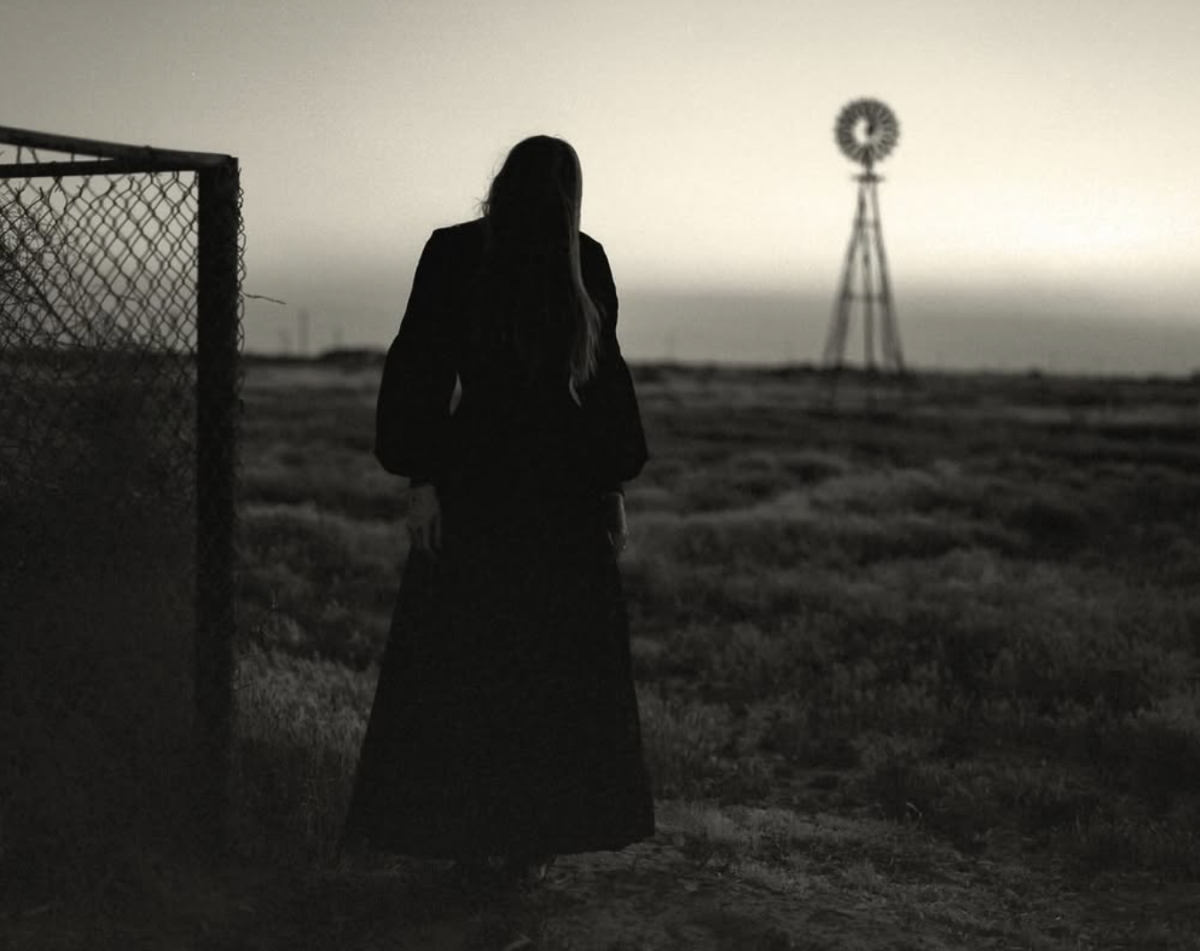
@mothercain

“Ethel Cain” is the stage name of Florida native Hayden Anhedönia, who drew critical acclaim and the internet’s attention following her 2022 debut LP “Preacher’s Daughter.” Her artistry is largely lore-driven: “Preacher’s Daughter” follows the character Ethel Cain as she runs away from home and meets a man who promises to show her the West, only to be murdered and cannibalized by him. Her narratives weave in themes of intergenerational trauma, gendered violence and the intersection between queer identity and Christianity, all set over the sound of haunting southern gothic instrumentation. Anhedönia specified that her new album, “Perverts,” is not part of this Ethel Cain lore.
“Perverts” feels like an analog horror soundtrack — like a demon chasing you through a haunted house, like drifting aimlessly through the ocean at twilight. It takes the haunting darkness of “Ptolemaea,” the climax of her debut LP, and dials it up to 100. Anhedönia drew inspiration from an abandoned power plant in rural Pennsylvania, whose brutalist architecture informs the album’s sound.
In November 2023, Anhedönia uploaded a video on YouTube that acts as a key to solving the puzzle of “Perverts.” She describes her philosophy relating music to God and her theory of the “ring” and “divine theatre.” “Rings” are songs that resonate across numerous frequencies. When you concentrate on the ring and feel surrounded by the music, you undergo the “pull,” which brings you from Earth into the “Divine Theatre.” There, you experience euphoria and serenity; it’s the closest to God you can get. Anhedönia explains that there’s a veil between you and God in this place, which you can touch but cannot pass through. If music gives you full-body chills — or makes you feel like you’re floating, surreal and unbelievably present and alive — then you know what Anhedönia means.
The 12-minute title track opens the project, starting with a bone-chilling lo-fi rendition of “Nearer, My God, to Thee.” It sets the tone for the album, which struggles between nearness to God and the perversions that separate us from him. The title track is sparse, often plunging into passages of silence and low hums.
Last November, Anhedönia released the lead single and second track, “Punish.” It opens with a squeaking porch swing and muffled piano and conforms to a verse-chorus structure. Anhedönia references Gary Plauché, who infamously murdered the man who kidnapped and molested his son. The chorus repeats, “I am punished by love,” a reference to the perverse desire of child predators. But there’s a secondary meaning. Anhedönia is a transgender woman who identifies as bisexual and often examines the intersection of queer identity and religion. As the narrator attempts to draw nearer to God, they must contend with the Church’s condemnation of their love.
The third track is “Houseofpsychoticwomn,” a 13-minute ambient number named after the autobiography by Canadian writer Kier-La Janisse. Anhedönia repeats “I love you” in a pitched-down distorted voice, infusing the phrase with sinister intention. The instrumentation is full of whooshing noises and eerie drones, as if you’re inside a washing machine. The fourth track and second single is “Vacillator,” which describes emotional numbness (“If you love me, keep it to yourself,” she repeats). The track melts into “Onanist,” another drifting number that depicts a narrator yearning for intimacy, as she incessantly states, “It feels good.”
The most intriguing track is “Pulldrone,” the 15-minute centerpiece of the project. Anhedönia opens with a spoken word monologue detailing the ‘12 stages of Simulacrum,’ as she called it in a recent Tumblr post. She took inspiration from French philosopher Jean Baudrillard, whose writing discussed simulation (imitations of reality) and simulacrum (imitations of things without an original, or whose original no longer exists). In this monologue, Anhëdonia explores the theology of the divine theatre, depicting the narrator’s ascension to it, the perversion of attempting to stay there, and the fall back to reality. Once the narrator returns to reality, there’s an intrinsic difference to it, thus becoming the simulacrum. Then comes 10 minutes of droning, a noise somewhere between a lawn mower and an electric razor. This track is a complicated (and sometimes painful) listen, one that is perhaps too indulgent to Anhedönia’s love of sprawl.
The drone gives way to “Etienne,” an 8-minute piano and guitar interlude, followed by “Thatorchia,” the climatic moment that sonically represents divine theatre. The album concludes with my personal favorite, “Amber Waves.” The instrumental is dreamy and oceanic, topped with a guitar riff drenched in reverb. Anhedönia explained on Tumblr that “Amber” is a personification of “love cast aside to get high.” It juxtaposes our association of the title with “America the Beautiful,” instead exposing the narrator’s longing to reach the ecstasy of divine theatre again through drugs. The track explores dissociation from material reality, drifting along its 11-minute runtime in a sonic purgatory. Anhëdonia ends the song simply stating, “I can’t feel anything.”
There’s an inescapable conclusion of “Perverts”: However fascinating the narrative may be, it’s largely unlistenable. The project spans 89 minutes, of which much is ambiance, noise or piano loops. The music often becomes unsettling and uncanny, too; I’ll admit I procrastinated my second listen out of fear. In interviews before its release, Anhedönia expressed discontent with her current fame. Her music fell victim to “tiktokification” as she believed listeners weren’t taking the art seriously or prioritizing aesthetics over material. “Perverts” is a bold challenge to the fandom, asking us to love Ethel Cain not just as a singer-songwriter project, but as a philosopher, a theologian, a lover of ambient sprawl and a pervert.